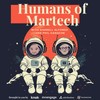
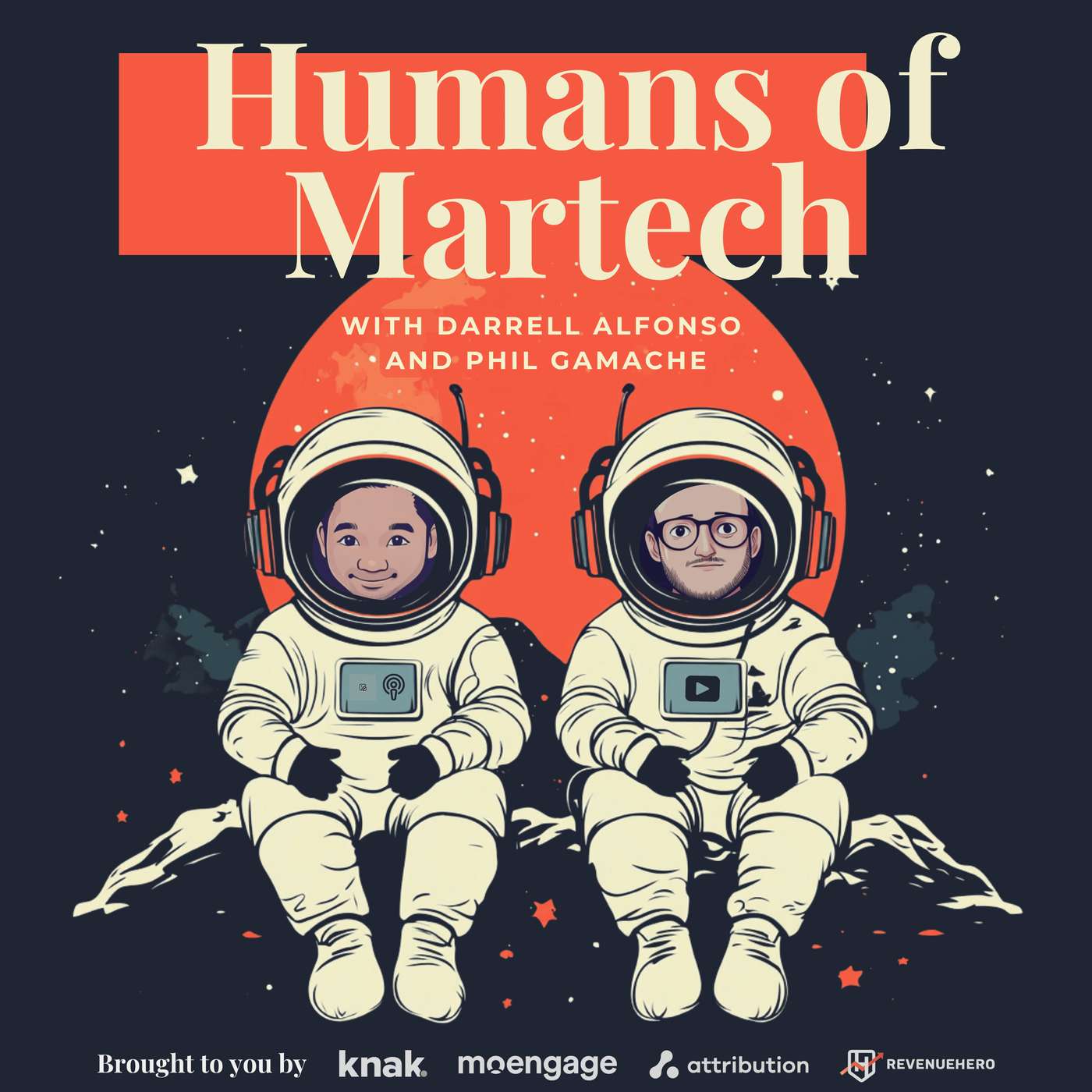
Humans of Martech
Phil Gamache
Future-proofing the humans behind the tech. Follow Phil Gamache and Darrell Alfonso on their mission to help future-proof the humans behind the tech and have successful careers in the constantly expanding universe of martech.
Episodes
Mentioned books
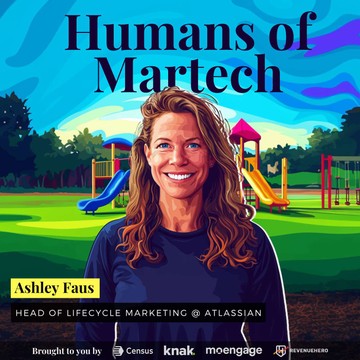
Apr 15, 2025 • 1h 8min
165: Ashley Faus: Building content that matches actual human thinking by integrating lifecycle, content and product marketing
What’s up everyone, today we have the pleasure of sitting down with Ashley Faus, Head of Lifecycle Marketing at Atlassian. Summary: Marketing frameworks often fail because they ignore how humans actually behave. People don't follow neat, linear paths; they explore, double back, and leap ahead based on genuine interests. Drawing from her diverse experience across corporate communications and lifecycle leadership, Ashley exposes how artificial walls between marketing functions create dysfunction while offering a solution: an integrated ecosystem where audience insights, compelling content, and strategic distribution flow continuously between teams. Her approach identifies truly predictive behaviors and measures success through bold experiments rather than smaller tweaks. By respecting how people naturally learn and make decisions, Ashley's content structure creates pathways that connect conceptual, strategic, and tactical pieces, making your content genuinely valuable to visitors and dramatically more effective at converting those ready to purchase.About AshleyAshely started her career with generalist marketing roles at a bunch of different small companies before settling into a role in the commercial aviation industryShe took on a generalist Marketing role at a training firm where she got a taste of marketing operations including a Marketo integration and lots of email campaignsShe later had 2 content strategy and product marketing roles at network security companiesToday Ashley is Head of Lifecycle Marketing, Portfolio at Atlassian where she’s been for over 7 yearsShe’s been interviewed on more than 50 podcasts, her writing has been published on TIME, Forbes, MarketingProfs, she’s a well traveled speaker and she has an upcoming book coming out in May called ‘Human-Centered Marketing: How to Connect with Audiences in the Age of AI’Why You Should Look for a New Job Every 18 MonthsAshley has spent over seven years at Atlassian, navigating through four distinct roles while the company itself transformed dramatically around her. This longevity stands out in an industry where most professionals change employers every 2-3 years. Through corporate communications, integrated media, product marketing, and now lifecycle marketing, she's crafted multiple careers without changing her email address.> "I look for a new job every 18 months, so that I am prepared to make a move and solve for any gaps at that roughly two to two and a half year mark.""I look for a new job every 18 months," Ashley explains, "so that I am prepared to make a move and solve for any gaps at that roughly two to two and a half year mark." This calculated strategy creates perpetual career momentum. You begin exploring opportunities six months before the typical stagnation point, positioning yourself to evolve professionally right when most people start feeling restless. The genius lies in the timing: plan your next move while you still love your current role, not after burnout or boredom sets in.The company Ashley joined barely resembles today's Atlassian. "We actually have grown like five or six times, both from an employee standpoint and from a revenue standpoint as well," she notes. This parallel evolution of both person and organization created a unique synergy, allowing her to ride waves of company growth while pursuing her own skill development.Her initial role came with an unexpected twist. Despite being hired for corporate communications, PR represented one of her weaker skill areas. During interviews, the hiring manager focused more on her versatility across content strategy, email marketing, and social media. Genuine curiosity opened doors that formal applications never could. "Because I was nosy and stuck my nose in other people's business," she admits candidly, "they were like, 'should you come sit with us?'" These informal interactions led to her integrated media role, which connected previously siloed functions:Press relationsOwned channels like email and socialThought leadership contentBrand marketing campaignsAshley applies this proactive mindset when managing her team. She challenges them with pointed questions about their future: "Who do you want to be when you grow up? Are you growing up in the next year? In the next five years?" This framing transforms vague aspirations into concrete timelines. "That breakdown of how to get to where you want to be in 10 years, 15 years, 20 years starts with the next 12 months or 24 months," she explains.The social media team placement at Atlassian illustrates how organizations evolve their understanding of marketing channels. "At the time, our social media person sat on the email team because the mindset was that this is a broadcast channel," Ashley recalls. Both she and her interviewer recognized the flawed logic in treating social platforms as one-way communication tools, creating immediate rapport around a shared marketing philosophy.Key takeaway: Schedule dedicated job hunting time every 18 months, even when fully satisfied with your current position. This practice maintains your market value, expands your professional network, and positions you to make strategic moves at the two-year mark when growth typically plateaus. The next perfect role might exist within your current company if you actively seek it out.The Overlap Between Lifecycle, Content and Product MarketingMarketing departments love creating artificial walls between functions. Product marketing owns messaging. Content creates assets. Lifecycle handles channels. We've all seen the org charts with their neat little boxes. Ashley brings refreshing clarity to this organizational fallacy, particularly for companies using product-led growth strategies where traditional marketing borders simply cannot hold.The organizational divide shifts dramatically depending on your go-to-market motion. "In larger companies using product-led growth versus a sales-led motion, there's a lot more blurring of the lines," Ashley explains. SEO strategy, trial signups, and in-product upgrade experiences often migrate to product marketing in PLG companies, even at enterprise scale. This reveals a fascinating truth many marketers miss: your core GTM motion fundamentally reshapes role boundaries more than company size does.> “I don't understand how you're gonna write content with no insights from the market, the competition, and the audience. I don't understand how you're gonna distribute content with no understanding of the channel mix and the quirks of the different channel."Ashley's decade of experience across multiple marketing functions gives her rare perspective on their interdependence. Ten years ago, she led marketing strategy at Duarte when marketing automation platforms were just becoming table stakes. "I actually had to do the RFP, choose between Marketo, Pardot, or Silverpop," she recalls. This hands-on experience taught her how lifecycle marketing (channels, nurture campaigns, cross-sell strategies) and content marketing (creating assets for those channels) form an inseparable partnership:Content marketing typically focuses on creating assetsLifecycle marketing typically focuses on channel strategyBoth become meaningless without the other's expertiseAt large companies like Atlassian, specialization creates absurd scenarios where a single email might involve five different people: one writing copy, another creating visuals, someone handling lead scoring, another doing audience segmentation, and finally someone building and testing the actual email. While this level of specialization brings depth, it risks bre...
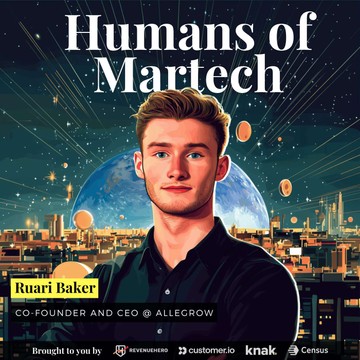
Apr 8, 2025 • 1h 1min
164: Ruari Baker: The 3 most important things you can do for email deliverability: Multi-subdomains, email validation 3.0 and good ol’ postmaster
What’s up everyone, today we have the pleasure of sitting down with Ruari Baker, Co-Founder and CEO of Allegrow. Summary: Your fancy AI personalization messaging strategy doesn’t mean anything if you don’t also have a strategy for email deliverability. Ruari busts long-standing myths about HTML vs plain text, why open rates died with Apple's 2021 privacy changes, and why the spam complaints visible in your marketing platform represent a fraction of reality. You'll walk away with 3 deliverability tactics that will help you reach the inbox and stay there: implement multi-subdomains to isolate high-risk traffic, adopt contact risk scoring that transcends basic validation and start using Google Postmaster to see your actual reputation metrics. Escape the promo tab without sacrificing design, resurrect damaged domains, and find out why traditional seed testing is worthless. If you depend on email, this might be the best 40 minutes you’ll spend this month. About RuariRuari started entrepreneurship early (at 18 years old) and joined a startup accelerator where he received mentorship from top tech founders in the UK as well as his first investmentHe co-founded Direct Software, a GDPR-first marketing automation solution where he gained a deep understanding of email deliverabilityToday, Ruari is Co-Founder and CEO of Allegrow, an email deliverability platform to help emails reach the primary inbox, not the spam folderPlain Text Emails Will Always Outperform HTML Emails When it Comes to Inbox PlacementThe HTML vs text email question hangs over every marketer's campaign planning session like a dark cloud. Ruari slices through this persistent debate with razor-sharp clarity. Context dictates winners here, not blanket rules. For outbound sales, plain text creates an authenticity that HTML instantly kills. Think about it—you craft personal emails without fancy formatting. The second your recipient spots that polished design, their brain categorizes your message as "marketing material," and your personalization efforts crumble.> “You can't just simply say 'always plain text, that's better.' The reality is there are still good business reasons for using Rich HTML, and that's why it is such a popular way to send emails from a marketing perspective.”Email providers have learned to associate complex formatting with promotional content that users often ignore. Your deliverability suffers accordingly. Yet HTML emails persist for good reason:Large subscriber lists benefit from HTML's clickthrough tracking capabilitiesE-commerce companies generate higher engagement when customers see products directlyVisual brands communicate their identity more effectively through designed templatesData-heavy messages become more scannable with proper formatting and hierarchyThe winning strategy lives somewhere in the messy middle. "If you're using HTML for legitimate marketing emails to an opted-in list, implement these practices to maintain deliverability," Ruari advises. Clean your entire list monthly—remove invalid contacts, keep bounce rates low, and eliminate potential spam trap subscriptions. This simple 30-day hygiene ritual dramatically improves your sender reputation with both ESPs and inbox systems.HTML devotees should strategically incorporate plain text messages at key points in the subscriber journey. These unadorned communications slip past promotion folder algorithms, landing you in the primary inbox. This placement success creates a virtuous cycle, improving future message placement—even for your HTML campaigns. You must also implement a sunset policy for engagement maintenance. When subscribers show zero activity over your predetermined period, place them into a final-attempt workflow. No response? Remove them proactively. This keeps your engagement metrics healthy, the exact data points email providers scrutinize when judging your sending quality."I once worked with an e-commerce client who switched half their abandoned cart emails to plain text," Ruari shares. "Their revenue per email jumped 22% because more messages reached the primary inbox." The results speak volumes about matching format to objective rather than defaulting to what looks prettiest in your marketing dashboard.Key takeaway: Match email format to specific objectives. Use plain text for sales outreach and relationship-building. Deploy HTML strategically for e-commerce and visual campaigns. Maintain ruthless list hygiene by removing invalid contacts monthly, sending occasional plain text messages regardless of your primary format, and cutting unengaged subscribers after final reactivation attempts. Your deliverability—and ultimately your results—depend on this discipline.Create a Sunset Policy Based on Your Specific Industry Engagement PatternsYour email list contains a ticking time bomb of disengaged contacts that silently damage your sender reputation with every campaign. When asked about the right timeframe for removing inactive subscribers, Ruari offers a refreshingly nuanced take that shatters the "six-month rule" most marketers blindly follow. The optimal sunset policy timing depends entirely on your industry and baseline engagement metrics. Smart marketers look to identify and remove the bottom quartile or decile of subscribers based on engagement patterns specific to their audience.High-engagement industries demand different standards than low-engagement sectors. Imagine running email marketing for a compliance software company—a field few people find "sexy." Your engagement metrics naturally run lower than consumer brands, but those rare engagement spikes matter tremendously. When someone suddenly engages with your SOC 2 audit content after months of silence, that signals a critical buying window. Cutting them off after six months of inactivity would sacrifice valuable revenue opportunities unique to your industry cycle.You must establish internal benchmarks that reflect your specific business reality. Study your engagement patterns over 12-18 months. Look for natural dropoff points. Analyze which inactive subscribers eventually reactivate and what triggers that behavior. Create segments based on these findings, then craft sunset workflows that reflect the actual customer journey in your space. For some businesses, 90 days makes sense. For others, 12 months barely captures their sales cycle.> “At least having some sunset policy in place would already put you leaps and bounds ahead of the majority of your peers.”The mere existence of a sunset policy puts you "leaps and bounds ahead of the majority of your peers," Ruari points out. Most marketers obsessively protect their list size, treating subscriber counts as a vanity metric rather than focusing on engagement quality. They hoard inactive emails like digital dragons, destroying deliverability in the process. Your sunset policy doesn't need to be perfect—it simply needs to exist and run consistently. Start by removing obvious dead weight: bounced addresses, spam complaints, and truly inactive accounts. Then refine your approach as you gather more data about your specific audience patterns.Key takeaway: Create a sunset policy based on your specific industry engagement patterns rather than arbitrary timeframes. Identify your bottom-performing subscriber segment (by quartile or decile) and implement an automated workflow to either re-engage or remove them. Even an imperfect sunset policy executed consistently will dramatically improve your deliverability metrics and campaign effectiveness compared to never removing inactive subscribers.How to Escape Google Promotions Tab Prison Without Sacrificing DesignYou send a gorgeous HTML email campai...
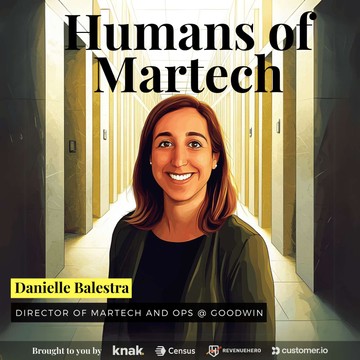
9 snips
Apr 1, 2025 • 59min
163: Danielle Balestra: Building AI and Martech Stacks Inside Regulated Enterprise is More Rewarding Than Startups
Danielle Balestra, Director of Marketing Technology and Operations at Goodwin, is an expert in martech within regulated enterprises. She discusses transforming marketing operations into strategic drivers for business. Danielle highlights the unique challenges of implementing AI and martech in regulated fields like law and healthcare. She also delves into how budget management and organizational dynamics impact marketing success. Additionally, the role of emotional connections in storytelling and its relevance to engaging with martech content is briefly touched upon.
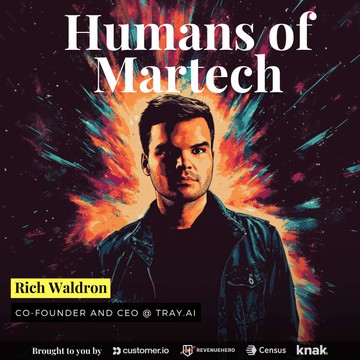
Mar 25, 2025 • 1h 6min
162: Rich Waldron: How to build and manage AI agents from a single, composable platform without coding
What’s up everyone, today we have the pleasure of sitting down with Rich Waldron, Co-founder and CEO at Tray.ai. Summary: Marketing ops folks stand at a crossroads where iPaaS platforms and AI agents are colliding in crazy ways. Rich pulls back the curtain on what happens when workflows become agent "skills": Imagine your carefully built automations transformed into autonomous assistants that diagnose tech issues, provision applications, and manage complex Salesforce campaigns without manual intervention. Your marketing stack could suddenly act like a "junior admin" on demand, while you focus on strategy. The explosion of AI features has turned martech leaders into "AI referees" juggling competing vendor tools, yet those who master both fundamentals and experimental curiosity become "10X automation heroes" - the first teammates that are called when problems need solving. As Rich explains, career security comes from momentum, not stability.About RichAfter University, Rich spent several years building different projects in the UK which included a web agency, a media company and a mobile app for social gatheringsTray was officially founded in 2013, bootstrapped by selling Wellington boots on eBay – the early product idea was email automation but pivoted to enabling less technical people to utilize APIs to integrate their tech stackAlongside his 2 co-founders, they spent the better part of 4 years building the product and raising a seed round in 2015. Between 2018 and 2020, Tray grew from $500k to $20M ARRToday, Tray processes Billions of transactions across the platform every month and they’ve gone all in on the composable AI integration and automation movementThe Rise iPaaS and AI OrchestrationiPaaS exploded because enterprise suites were too slow to open up their integration capabilities. CDPs made similar mistakes with rigid architectures, birthing today's composable alternatives. Every software system eventually faces the same primal challenge: intercommunication. Rich recounts how this pattern also repeats throughout computing history with startling consistency. Monolithic ERPs dominated early landscapes, where engineers cobbled together custom connections between internal components. These hand-built bridges crumbled easily, leaving teams scrambling for standardized frameworks that could withstand daily operational stress.As specialized software proliferated around these central systems, integration pressure mounted. "We're still not that far through on adopting the cloud," Rich points out, puncturing the tech bubble many of us live in. While cloud technologies feel omnipresent to industry veterans, countless organizations remain firmly planted on physical servers. This reality created distinct evolutionary phases for iPaaS:On-premise to on-premise connections (the original integration challenge)On-premise to cloud bridges (MuleSoft's territory) Cloud-to-cloud orchestration (where Tray focused)Each phase demanded fundamentally different architecture. Cloud applications introduced unique payload structures, execution patterns, and API designs that rendered previous integration approaches obsolete. "Every application now has an API," Rich explains, describing how this technical shift triggered organizational transformation. Marketing departments grew increasingly technical, with marketing ops professionals discovering they could craft custom experiences by tapping into these newly accessible APIs.> "iPaaS has to evolve because if your iPaaS was built purely for an era when AI wasn't a consideration and your customers are now suddenly saying, 'We're looking at how we infuse AI in these processes,' the requirements have changed again."You've likely witnessed this evolution in your own organization. Remember when connecting two systems required an IT ticket and weeks of waiting? Now your marketing team builds automations while the sales team creates their own customer journey orchestrations. Technical power diffused across departments, democratizing integration capabilities previously locked behind developer expertise.Today's iPaaS platforms face their greatest evolutionary pressure yet: AI integration. Rich describes how existing processes built on traditional platforms now crumble under AI's weight. Semantic analysis, novel reasoning models, and entirely new integration approaches have rewritten the rules. iPaaS vendors who built for the pre-AI era now race to adapt as customers demand intelligent workflows. The platforms that flourish will embrace AI as a core architectural principle rather than a bolted-on feature.Key takeaway: Evaluate your integration platform based on whether it was (re)designed for today's AI-centric landscape or simply patched to accommodate it. The most effective iPaaS solutions evolve alongside major architectural shifts rather than struggling to catch up after they've occurred.What Makes an Agent Truly "Agentic" Beyond the Marketing HypeThe AI agent landscape is blurring with contradictions and wild claims and it’s only going to get crazier. While vendors plaster "agent" labels on everything with an algorithm, Rich isn’t worried about definition. The terminology matters far less than what these systems actually do. > "The AI isn't just reasoning over a set of data, but it's actually going and taking action on a user's behalf... I've done the response for you and I've handled the follow up and I've gone and filed this over here, and it's actually carrying out a series of actions based on the reasoning that occurred in the first place."AI agents take autonomous action. They handle support tickets end-to-end. They file documents. They complete multi-step processes without human intervention. They execute rather than suggest.Tray's team experienced genuine goosebump moments when they combined their connector infrastructure with LLM reasoning. You could almost hear the click as puzzle pieces fell into place. Their ten-year vision suddenly materialized before their eyes:Semi-technical staff performing complex cross-organizational tasksTeams breaking free from application limitationsWorkers escaping data accessibility problemsAI executing the best next steps, not just recommending themThis capability triggered an immediate "holy shit" reaction during internal testing. Everything changed in that moment. The strategic implications struck like lightning: adapt or die. Many category leaders fail exactly here, at this precipice of change, clinging to outdated paradigms while disruptive innovation rewrites the rules.The adoption curve is also likely to be shockingly steep. Century-old enterprises with conservative DNA are already running AI workloads in production using Tray. Some skipped entire technological generations, leapfrogging directly into AI implementation. They've dumped their data into databases, layered AI analysis on top, and built reactive systems around the outputs. The comfort level with these technologies has accelerated across industries at a pace that defies conventional adoption timelines.When Tray rebranded from tray.io to tray.ai, they acknowledged that connection alone provides insufficient value in this new world. The platforms that enable autonomous action through AI will dominate the future landscape. The rest will fade into technological obscurity, remembered only as stepping stones.Key takeaway: The future competitive advantage in your martech stack is going to come from AI that acts on your behalf, not just analyzes and recommends. When you implement systems where AI executes complex workflows based on reasoning, you empower your teams to achieve broader impact with fewer technic...
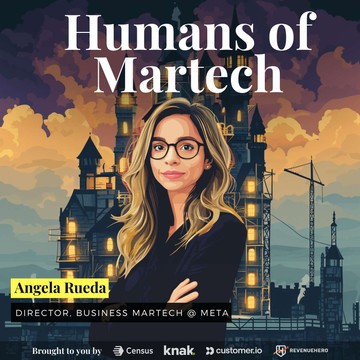
Mar 18, 2025 • 1h 4min
161: Angela Rueda: Meta’s Director of Martech on build vs buy, vendor selection and hybrid stacks
What’s up everyone, today we have the pleasure of sitting down with Angela Rueda, Director of Business Martech at Meta. Summary: Angela walked into Meta's engineering-first culture, discovering a sprawling mess of DIY custom martech solutions, and leading the organization through a fundamental mindset shift about build vs. buy decisions. She brings us through the technical and emotional journey of aligning more than 150 stakeholders ultimately forcing them to embrace a hybrid build-and-buy approach during a pivotal merger. Angela shares an honest look at what it means to lead big changes at a company like Meta, showing what really works when you're trying to transform how marketing and technology work together.About AngelaAngela started her career in the agency world before moving over to the financial services sector at Capital Group She took a break from the corporate world and co-founded a lifestyle product company for moms and babiesShe later returned to finance and joined Citibank where she would spend the next 8 years growing into a Director of Marketing Capabilities roleToday Angela is Head of Business Martech at Meta where she’s building a new team of data and performance marketersBuild vs Buy: Meta’s Transformation to a Hybrid Martech StackBuilding custom marketing technology sounds like a tech leader's dream: unlimited resources, world-class engineers, and total control over the final product. Angela walked into Meta with stars in her eyes, ready to architect a marketing infrastructure that would reach 200 million global businesses. The mandate sparkled with possibility - create something truly custom, uniquely Meta, uniquely powerful.Then reality hit. Meta's growth had spawned a sprawling organism of marketing tools, each piece stitched onto the next as urgent needs arose. What looked like a blank canvas from the outside turned out to be a complex tapestry of tactical solutions, each thread woven tight to solve an immediate problem. The engineering team kept adding features:Custom targeting modules for specific campaignsProgram-specific deployment toolsSiloed analytics systemsFragmented automation workflowsFor that first year, Angela doubled down on the in-house vision. Meta's engineering DNA made external tools feel almost taboo. The team kept building, feature by feature, convinced they could craft the perfect solution. You might recognize this mindset - when you're surrounded by brilliant engineers, buying off-the-shelf software feels like admitting defeat.A major organizational shift cracked the foundation of this thinking. Business marketing teams merged, exposing a stark reality: half the company used internal tools while the other half relied on third-party platforms. Maintaining multiple stacks drained resources and created confusion. The breaking point arrived organically - continue forcing an internal-only approach, or step back and reimagine the entire stack?This constraint sparked the creative breakthrough Angela had dreamed of, just not in the way she expected. The pressure to consolidate forced hard questions about build versus buy decisions. The team had to examine their assumptions about custom development and weigh them against business needs. That original blank canvas materialized after all, painted with the colors of experience rather than theory.What makes Meta's story feel universal is that enterprise teams everywhere build tech kingdoms in isolation, they’re all racing toward their own goals with blinders firmly in place. Marketing squads assembling custom tools and processes at breakneck speed, treating enterprise-wide alignment as a distant luxury and a future-team problem. Then all of a sudden, organizational shifts take place. Restructures, mergers, leadership overhauls… they generate enough force to crack these silos open. When the dust settles and processes collide, teams finally see the cost of their fragmented systems.Key takeaway: Build a hybrid Martech approach: identify core functions that need customization, integrate best-in-class tools for standard operations, and focus engineering resources on unique competitive advantages. Track implementation time and team satisfaction to measure impact.Why Meta Ultimately Ditched Their DIY Martech StackMeta's engineering culture practically demanded they build everything in-house. You could feel it in every meeting: the subtle eye rolls when someone mentioned third-party tools, the reflexive reach for custom solutions, the collective pride in crafting bespoke technology. Their homegrown marketing stack embodied this philosophy, sprouting feature after feature until it required a small army of PhDs just to create basic audience segments.Angela walked into this technical labyrinth with a mandate to reach 200 million global businesses. The existing tools scattered across Meta's landscape told a story of rapid growth and tactical thinking:Data lived in isolated kingdoms, making it impossible to identify true marketable audiencesCampaign targeting required advanced degrees and dedicated data science teamsChannel activation cobbled together "omnichannel" experiences through manual patchesSales and marketing data existed in parallel universes, never quite connectingThen came the organizational earthquake: a massive merger that exposed half the company running on internal tools while the other half relied on external platforms. The duplicate systems drained resources faster than a leaky pipeline. This crisis created a rare moment of organizational clarity, pushing Angela's team to step back and question their build-everything DNA.The evaluation process sparked intense emotions. Engineers who poured years into custom solutions defended their work with spreadsheets and scoring frameworks that mysteriously always ended in perfect ties. You could see the internal struggle written across faces in every meeting: let go of years of custom development or double down on the DIY approach? The breakthrough came through radical simplicity. Meta chose to build where they held unique advantages (their data foundation) and buy proven solutions for standard capabilities. This hybrid model gave both the engineering perfectionists and practical business stakeholders something to embrace.Key takeaway: Start with ruthless problem definition before touching tools. Map your unique challenges, build organizational alignment around those problems, then evaluate build versus buy decisions through that lens. Your best solution might combine internal strengths with external innovation, creating a practical path forward that serves both technical excellence and business reality.Build vs Buy Was Really Privacy Control vs Speed to MarketEngineering pride runs deep at Meta. Their developers wield a particular swagger, architecting some of the world's most sophisticated social platforms. So when Angela's team questioned whether to keep building marketing tools in-house, the debates turned fierce. The war room crackled with strong opinions about resource allocation, privacy constraints, and the true cost of maintaining bespoke systems.The arguments for building centered around three thorny challenges:Privacy requirements demanded granular control over data handlingData transfer costs between systems could balloon into millionsComplex account mapping for B2B marketing defied off-the-shelf solutionsYet the buy advocates painted a compelling picture: Meta's elite engineers could focus on revenue-generating products instead of reinventing marketing wheels. Angela watched the back-and-forth intensify as both camps dug in their heels. One side...
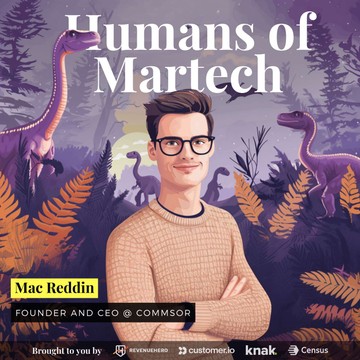
Mar 11, 2025 • 1h 4min
160: Mac Reddin: How to leverage dinosaurs to get warm intros and drive better pipeline
What’s up everyone, today we have the pleasure of sitting down with Mac Reddin, Founder and CEO of Commsor. Summary: Mac treks through the Jurassic wilderness of modern sales, where outbound campaigns cannibalize themselves while AI-powered sequences are degrading response quality by the day. Real marketing power flows through human networks, forward-thinking companies are transforming their SDR teams into relationship architects who measure success through network depth and authentic engagement. Be the team that does better. Your competitive edge lives in human connections that no algorithm can replicate, requiring a complete rethinking of how we incentivize and measure revenue team success.About MacMac is a career-long entrepreneur, his first business was a gaming network built on top of Minecraft which peaked at 150k users per dayHe went on to create various bootstrapped businesses over the course of 5 yearsHe created a substack newsletter for the community space which eventually evolved into an actual community of over 10k people One day he took part in a no-code hackathon and the idea of Commsor was born, initially a community reporting and metrics platformToday Commsor is a 40-person company focused on curated introductions and building the go-to-network movementThe Origin of the Dinosaur Brand Came From a TypoA misspelled tweet transformed Commsor's brand identity forever. Someone wrote "Commsaur" instead of "Commsor" on Twitter, sparking an organic evolution that proves how authentic brand moments outperform manufactured marketing strategies.The story unfolds with raw honesty from Mac: "It became an inside joke, then our internal branding, and eventually our entire visual identity." No marketing committees. No focus groups. No desperate attempts to retrofit meaning into the accident. The team simply recognized the genuine enthusiasm building around their accidental dinosaur mascot and rolled with it.Consider these organic moments that cemented the dinosaur's place in Commsor's DNA:* A casual Slack screenshot sparked employee excitement* Internal conversations naturally incorporated dinosaur references* Team members added dinosaur emojis to their social profiles* Customers started associating the brand with its prehistoric mascotThe business impact materialized in unexpected ways. One prospect lost Commsor's name but remembered the dinosaur. They scoured LinkedIn for employees with dinosaur emojis in their profiles, found the company again, and booked a demo. This kind of brand recall demonstrates how authentic visual elements create deeper connections than carefully crafted corporate identities.Mac's experience teaches a powerful lesson about modern branding: manufactured meaning falls flat. When the team needed a new logo, they faced zero resistance to the dinosaur concept because it already represented their culture. You can't engineer this kind of organic brand evolution in a marketing workshop or through trend analysis.Key takeaway: Authentic brand moments emerge from genuine team interactions and customer connections. A typo-inspired dinosaur logo drives more business value than countless hours of strategic brand planning because it represents something real: a company culture that embraces creativity, humor, and happy accidents.Why Your Mass Outbound Strategy Cannibalizes ItselfMass outbound marketing operates like a ravenous snake devouring its own tail. Every blast campaign you send erodes response rates across the entire ecosystem, forcing you to send even more emails to hit your targets. Mac draws on the ancient Ouroboros symbol to illustrate this self-destructive pattern playing out in marketing departments worldwide.You feel the tension daily: outbound outreach serves essential business functions. Your team needs to:* Connect with potential podcast guests* Build strategic partnerships* Source vendor relationships* Develop sales opportunities* Nurture industry relationshipsYet the industrialization of this process through purchased contact lists and templated messages has created a toxic environment. Response rates plummet while marketing teams double down on volume, hoping quantity will save them. The math gets uglier each quarter: 10,000 emails become 20,000, then 50,000, as engagement metrics spiral downward. Your carefully crafted messages drown in an ocean of automated noise.Mac points to the last two years as a breaking point. Marketing teams hurtle toward catastrophe like Thelma and Louise, eyes locked on the dashboard metrics instead of the cliff ahead. The cognitive dissonance feels suffocating - everyone privately acknowledges the broken system while publicly defending increasingly desperate tactics. AI tools threaten to accelerate this race to the bottom by making it even easier to flood inboxes with personalized-but-soulless outreach.Your outbound strategy needs a reset focused on human connection. Replace mass automation with careful curation. Send fewer messages with deeper personalization. Study your target accounts' actual needs before reaching out. The marketers who thrive will build systems around quality interactions, not maximum velocity. This shift feels counterintuitive when every internal metric pushes for more volume, but the alternative leads off a cliff.Key takeaway: Break the cycle of mass outbound marketing by prioritizing quality over quantity. Build genuine connections through carefully researched, personalized outreach that demonstrates real value to your recipients. The future belongs to marketers who choose meaningful engagement over maximum velocity.The Brutal Math Behind Why Your Sales Outreach Dies UnreadB2B buyers now receive 500% more cold outreach than three years ago. The math becomes brutal: every sales message you craft competes with hundreds of others in an attention economy that's hitting its breaking point. Your thoughtfully personalized email drowns in the same inbox flood as automated spam blasts and LinkedIn form messages.Think of outbound sales channels like a public park destroyed by overuse. Each individual visitor might leave only a small trace, but multiply that impact by thousands. That's what's happening to email, phone, and social outreach. Even when you craft the perfect message, your prospects have already built defensive walls:* Automated email filters that quarantine anything resembling sales language* Phone settings that send unknown numbers straight to voicemail* Browser extensions that block LinkedIn connection requests* Calendar apps that require "approved sender" statusA recent conversation with a frustrated sales leader crystallized this reality. He argued that CEOs who ignore cold outreach risk missing game-changing opportunities. But flip that logic: as a CEO of a small company, Mac sees hundreds of pitches monthly. Each one demands attention, evaluation, and response time. For leaders at larger organizations, that number multiplies exponentially. The brutal reality is that most prospects physically lack the hours needed to evaluate your message, no matter how brilliant.The psychology of modern buyers reflects this overwhelm. When you receive 50+ sales messages daily, pattern recognition kicks in. Your brain builds shortcuts, filing anything that looks like outbound into the "deal with later" folder (which really means never). Sales teams chase prospects through an ever-shrinking window of attention, while buyers fortify their defenses against the growing assault on their time.Key takeaway: The outbound sales crisis stems from pure mathematics: too many messages chase too...
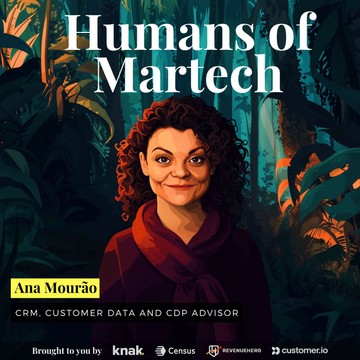
Mar 4, 2025 • 53min
159: Ana Mourão: Privacy-first data literacy and modernizing legacy martech at a global enterprise with data templates and POCs
What’s up everyone, today we have the pleasure of sitting down with Ana Mourão, CRM, Customer Data and CDP Advisor.About AnaAna started her career in the financial services sector before moving to field marketing and ecomm partnershipsShe then spent 5 years as a Marketing leader at 3MShe created the Experimental Marketer framework to help marketers take ownership of martech Today Ana is CRM, Customer Data and CDP Advisor working with Fortune 500 customers advising on data architecture, digital engagement and customer journeysMartech Leaders Must Become Systems ArchitectsIn theory, we all understand that martech has the potential to shape customer experiences, transform internal processes, and drive business growth. But mastering individual tools offers limited value. Ana's experimental marketer framework proposes an interesting ideat: martech professionals must evolve into systems architects who orchestrate intricate technological ecosystems while maintaining laser focus on business outcomes.The framework, born from Ana's battlefield experience, advocates for marketers to embrace technology as a force multiplier. You already understand how martech drives conversions and engagement. Now imagine wielding that same power to revolutionize marketing operations, break down departmental barriers, and create seamless workflows that amplify team performance. This systems-level thinking separates strategic leaders from tactical operators.Marketing technologists possess unique insights into customer engagement processes, campaign execution, and performance optimization. The framework pushes you to leverage this knowledge beyond traditional boundaries. Step into cross-functional conversations with authority. Guide IT and operations teams toward solutions that serve marketing's mission while improving organizational efficiency. Your perspective proves invaluable in bridging the gap between technical capabilities and business objectives.Consider the ripple effects of your technology decisions. Each tool implementation, integration choice, and process automation creates waves that impact multiple teams and workflows. By viewing martech as an interconnected system rather than isolated solutions, you'll spot optimization opportunities invisible to those stuck in departmental silos. This elevated perspective transforms you from a tool specialist into a strategic architect of marketing operations.Some practical applications Ana recommends:Map your martech ecosystem to identify connection points and dependenciesDocument cross-functional workflows to pinpoint friction and improvement opportunities Facilitate regular discussions between marketing, IT, and ops teamsEvaluate new tools based on their system-wide impact, not just feature listsBuild processes that scale across teams and technologiesKey takeaway: The future demands marketing technologists who think in systems, not silos. Build your strategic value by understanding how technologies interconnect, impact multiple stakeholders, and drive both customer engagement and operational excellence. Your ability to architect comprehensive solutions while maintaining big-picture perspective will determine your success in this increasingly complex landscape.Lessons from Stanley Black & Decker's Data TemplateMarketing technology demands ruthless precision in system design. When tools operate in isolation, data fragments and teams falter. Ana examines how Stanley Black & Decker, the world’s largest industrial tool company, architected a unified martech ecosystem that transformed scattered tools into an integrated engine of market intelligence.Strategic Foundation & Business ContextMost B2B companies operate with dangerous blind spots between their distribution channels and end users. Ana shares how Stanley Black & Decker dismantled these barriers by architecting an integrated martech system across emerging markets. Their goal transcended basic data collection; they sought to reshape product development and go-to-market strategies through direct end-user intelligence.The system's strategic architecture spanned Latin America, Asia, Middle East, and Africa, deliberately excluding mature markets to focus on high-growth regions. This geographic scope demanded sophisticated balance between centralized control and local market agility. Rather than imposing rigid global templates, the architecture provided regional teams with dynamic frameworks for market-specific adaptation while maintaining brand integrity.Local empowerment emerged through granular control mechanisms. Teams gained the ability to modify email templates, adjust campaign elements, and launch market-specific promotions without technical dependencies. This operational autonomy accelerated time-to-market while reducing vendor reliance. A promotion in the Philippines could launch within hours instead of weeks, using pre-approved templates that maintained brand standards while accommodating local market conditions.The Tech Stack Evolution and Adding a CDPMarketing automation tools give your stack lightning-fast reflexes. They'll send emails, trigger workflows, and chase leads across channels with robotic precision. But Ana's work with Stanley Black & Decker exposed an uncomfortable truth: pure automation creates mindless action without strategic intelligence. You need a brain, not just a nervous system.The team's marketing automation platform fired off messages like clockwork. Yet it remained blind to the deeper patterns hiding in plain sight. User behaviors painted intricate stories: Anna gravitating toward e-commerce content while ignoring product launches, segments showing distinct engagement rhythms across markets. These crucial signals vanished into the void between automation triggers.The Customer Data Platform (CDP) entered as the cognitive center, not another mechanical add-on. This neural hub absorbed data streams from every market, brand, and channel. It learned to recognize behavior patterns, predict engagement paths, and surface hidden user affinities. The stack evolved from a collection of reflexes into an intelligent system capable of adapting to market-specific needs while maintaining coherent user understanding.Data Governance Through a Data TemplateData governance rarely sparks joy. Yet Ana's work at Stanley Black & Decker proved that operational elegance hides in unexpected places. A data template, speaking the CDP's native language, transformed scattered global operations into a synchronized intelligence network without strangling regional teams in process.The system worked through elegant behavioral design, not brute-force mandates. Forms matching the template's structure flowed seamlessly into unified customer profiles within 36 hours. Non-compliant data languished in digital limbo, requiring manual resurrection through tedious cross-departmental coordination. This natural selection pressure rapidly evolved team behavior from template resistance to passionate advocacy.Market dynamics morphed at quantum speed. Regional teams caught form errors before deployment. Landing pages multiplied perfectly across continents. Data streamed automatically into unified profiles while teams slept. New requirements integrated organically without breaking existing flows. Most critically, cross-market performance comparison transformed from weeks of reconciliation hell into instant insight generation.The template's adaptive properties challenged conventional governance wisdom. It maintained rigid standards while enabling local flexibility....
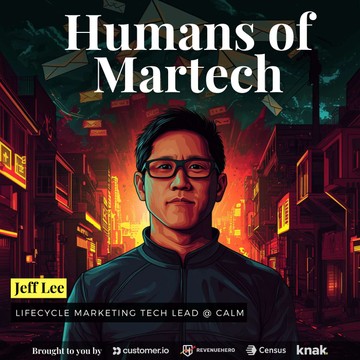
4 snips
Feb 25, 2025 • 51min
158: Jeff Lee: How Calm’s Billion customer message machine unites martech and engineering
Jeff Lee, Lifecycle Marketing Technical Lead at Calm, is an expert in forging impactful engineering-marketing partnerships. He shares insights on the crucial relationship between lifecycle marketing and engineering, emphasizing the need for technical credibility in collaboration. Jeff humorously recounts sleep challenges, connecting unique audio content to relaxation techniques. He also discusses the complexities of push notifications, the significance of a united marketing tech stack, and the balance of technical implementation with creative strategies.
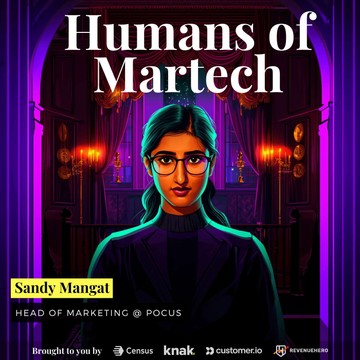
5 snips
Feb 18, 2025 • 59min
157: Sandy Mangat: How to fix outbound with a crystal ball and signal-powered AI agents
Sandy Mangat, Head of Marketing at Pocus and an expert in AI and product marketing, dives into the crisis of outbound sales. She discusses how automation has wreaked havoc on genuine connections, leaving inboxes flooded with generic messages. Sandy highlights the importance of using AI for insights that personalize outreach and advocates for a hybrid sales approach that combines technology with relationship-building. They also touch on the complexities of lead scoring and the vital need for collaboration between sales and marketing teams.
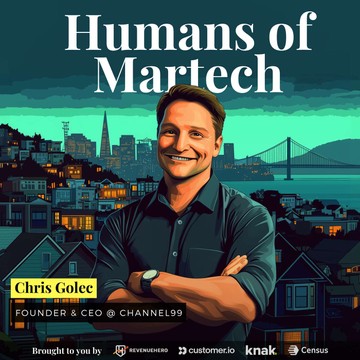
Feb 11, 2025 • 59min
156: Chris Golec: The Godfather of ABM is on his 3rd company and he’s solving attribution for B2B marketers with AI
Chris Golec, Founder and CEO of Channel99, shares his remarkable journey from chemical engineering to Silicon Valley’s marketing tech landscape. He discusses the essential role of company culture in B2B success and the challenges of remote work. Golec dives into his pioneering work in AI-powered attribution, aiming to revolutionize marketing ROI predictions. He also reflects on turning marketing failures into growth opportunities and explores the future of Account-Based Marketing, emphasizing data-driven strategies and financial alignment for success.


